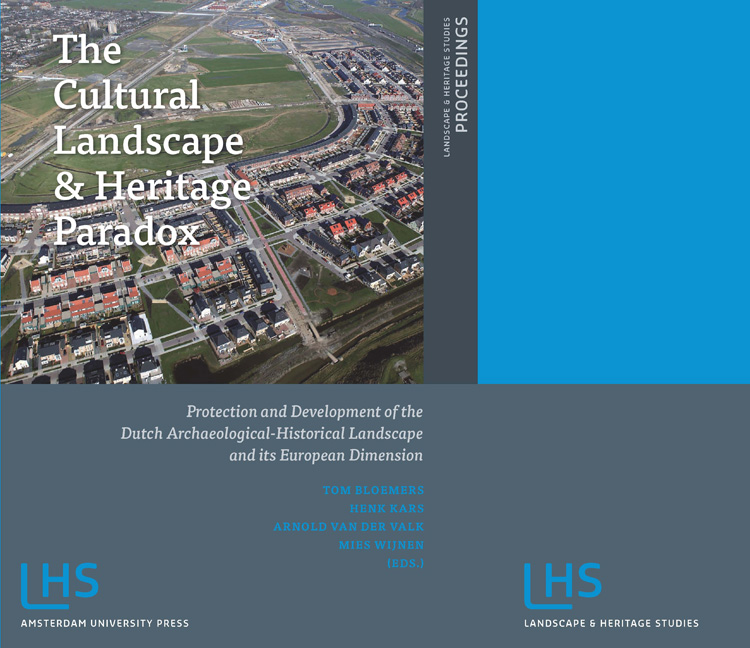 The Cultural Landscape and Heritage Paradox
The Cultural Landscape and Heritage Paradox Book contents
- Frontmatter
- Contents
- Preface
- I INTRODUCTION
- II INSIGHTS AND PROSPECTS OF ARCHAEOLOGICAL-HISTORICAL LANDSCAPE STUDIES
- III LINKING KNOWLEDGE AND ACTION
- IV IMAGINATION - FACTS AND CONSTRUCTIONS
- V SHARING KNOWLEDGE - STORIES, MAPS AND DESIGN
- VI SYNTHESIS AND CONCLUSIONS
- VII MANAGEMENT OF KNOWLEDGE
- VIII AGENDA FOR THE FUTURE
- IX SUMMARY
- X APPENDIX
- Subject Index
- Index of Places and Regions
8 - Cultural Landscapes in the Mirror. What Information Systems Reveal about Information Management and Cultural Landscape Research
Published online by Cambridge University Press: 21 January 2021
- Frontmatter
- Contents
- Preface
- I INTRODUCTION
- II INSIGHTS AND PROSPECTS OF ARCHAEOLOGICAL-HISTORICAL LANDSCAPE STUDIES
- III LINKING KNOWLEDGE AND ACTION
- IV IMAGINATION - FACTS AND CONSTRUCTIONS
- V SHARING KNOWLEDGE - STORIES, MAPS AND DESIGN
- VI SYNTHESIS AND CONCLUSIONS
- VII MANAGEMENT OF KNOWLEDGE
- VIII AGENDA FOR THE FUTURE
- IX SUMMARY
- X APPENDIX
- Subject Index
- Index of Places and Regions
Summary
ABSTRACT
Information systems on cultural landscapes and their broader contexts in European countries are not without problems. As this foremost relates to knowledge and information management issues, these issues are highlighted in this contribution. In doing so, the emphasis is on the information content, because this is decisive in what is possible and pertains to issues such as:
- What is modelled (or not) and from which cultural landscape research approach and aims, e.g. knowledge, values or characterizations. Which kinds of objects? What about typologies, etc.? Who are the makers and users?
- Levels of modelling, starting from a conceptual analysis or from logical or technical design and from higher or lower administrative levels.
- The adaptation to new or changing needs and landscape views and the integration of systems.
- What does the situation show about awareness and expertise as essential aspects in knowledge and information management?
Information systems and the overall information picture at the pan-European level and in the United Kingdom, the Netherlands, and Germany are discussed within this framework. This is mainly done from a historical-geographical perspective, although the archaeological information situation is also discussed with reference to the Netherlands.
In its current form, conceptual thinking is generally weak, although there seems to be more awareness of this in Germany and the United Kingdom than in the Netherlands. The differences in knowledge and information management seem bigger. This is much more an issue in the United Kingdom than in the Netherlands, with Germany in an in-between position. Germany takes the lead in discussions and reflection. At the European level, in both issues the situation is mainly dependent on the countries and their representatives.
KEY WORDS
Information system, usability; cultural landscape, modelling; conceptual, knowledge, values
INTRODUCTION
These days, information systems are a fact of life in practices concerning cultural and historical landscapes. While their purpose, to store and to provide knowledge, information and values, appears to be straightforward, their usability can be quite problematic. Usability means the ability to fulfill the information needs of (potential) users, which requires the makers to be well aware of what an information system really is about.
- Type
- Chapter
- Information
- The Cultural Landscape and Heritage ParadoxProtection and Development of the Dutch Archaeological-Historical Landscape and its European Dimension, pp. 605 - 628Publisher: Amsterdam University PressPrint publication year: 2010
